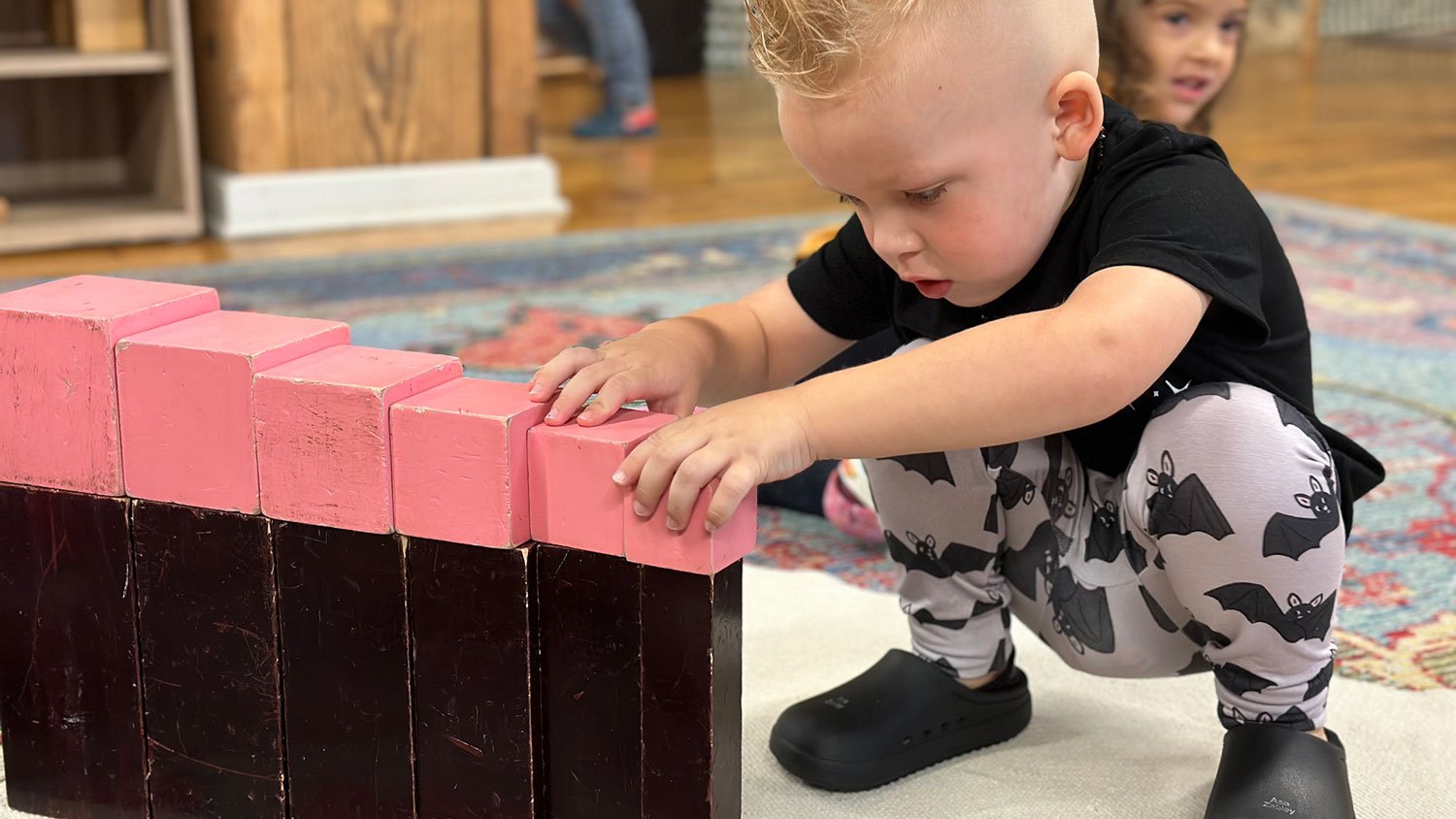
Our Programs
The Montessori classroom is multi-age for many reasons, and the ages at which students accomplish objectives is fluid. There are, however, in the Montessori method, focused curriculum based on the age of the child, helping to systematically reveal the world to him or her.
The Toddler Classroom (24 – 36 Months)
Our Toddler Program is all about nurturing the whole child—mind, body, and spirit—through authentic Montessori education. This is a special time in your toddler’s development, as their brain is primed to learn important new skills, like toilet learning, feeding themselves, dressing, and building social and emotional connections.
In our Montessori classroom, toddlers are surrounded by a language-rich environment full of opportunities to learn through conversation, storytelling, reading, and singing. They also develop practical life skills, such as caring for themselves and their surroundings.
Our sensory activities, including puzzles, sewing, painting, and cutting, help improve hand-eye coordination and offer a hands-on way to learn. The Toddler Program provides a strong foundation for growth, and when children are ready, they transition into our Primary Program for ages 3–6.
The Primary Classroom (Three Years – Kindergarten)
In the Primary Classroom, we provide a rich and engaging Montessori environment where children from ages 3 to Kindergarten (6 years old) grow and learn at their own pace. The program is designed to meet the developmental needs of each child, with a focus on nurturing their independence, social skills, and love of learning.
At age three, children are at a sensitive developmental stage, where they are naturally inclined to understand and develop skills related to their senses, grace and courtesy, and physical order. This is the ideal time to begin teaching foundational social behaviors, like saying “Good morning” or practicing polite greetings. At this age, the focus is on helping the child connect with their environment and building their awareness of the world around them.
As children move into their fourth year, the connection they’ve established with their environment becomes the foundation for developing social integration. Four-year-olds are ready to experiment with social behaviors, and our classroom environment is carefully prepared to support this transition. Their growing attention span, concentration, independence, and understanding of order prepare them to explore their social world and interact meaningfully with others.
By the time children reach kindergarten, they’re ready to deepen their connection with both their environment and their social world. The third year of the Primary Program brings all their concrete learning experiences together, providing a solid foundation for more abstract concepts and relationships. Our program aligns with West Virginia State Curriculum Standards, ensuring that kindergarten students are well-prepared for public school or for advancing to our Lower Elementary classroom to continue their Montessori journey.
Kindergarten students take on leadership roles within the classroom, modeling peaceful behaviors for their peers and younger students. They learn to work cooperatively, rather than competitively, helping to create a productive, harmonious classroom community.
In the Primary Classroom, children develop the skills they need to thrive both academically and socially, setting the stage for a lifetime of learning and growth.
The Lower Elementary Classroom (First Grade – Third Grade)
Our elementary teachers are dedicated to inspiring students to reach their full potential through a discovery-based approach to learning. The Montessori elementary curriculum is designed to help students see the connections between subjects, making learning feel meaningful and engaging. Students explore the interrelationships between math, language, history, science, and geography, gaining a deeper understanding of how everything is connected.
Our curriculum goes beyond traditional grade-level expectations and standards, focusing on the individual interests and abilities of each student. Lessons are personalized and paced according to each child’s needs, allowing them to work at their own speed. Concrete, hands-on materials are used to help students grasp abstract concepts, and while independent work is encouraged, students also collaborate in small groups or with mentors, helping them develop social and teamwork skills.
Montessori students learn in an integrated way, working through extended learning blocks rather than separate, timed subjects. This approach helps them gain a deep understanding of the “hows” and “whys” of the world around them. Core subjects like math, language, history, geography, science, and geometry are introduced using hands-on materials and small group lessons, with students following up with independent work and ongoing teacher guidance.
Children also enjoy weekly classes outside their regular classroom, including Spanish, art, music, and physical education, helping them develop well-rounded skills and interests. Our goal is to cultivate not just academic knowledge, but a lifelong love of learning, critical thinking, and problem-solving.




